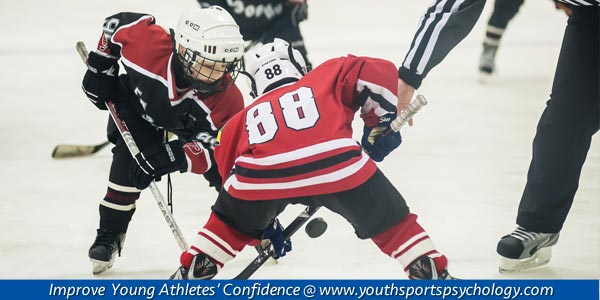Sports Kids And Moving on After Mistakes or Losses
Does your young athlete say things like, “I can never hit a good one,” or, “I’m always a terrible player,” or “Things never work out for me” after a tough game or competition?
That’s a red flag, says Tamar Chansky, Ph.D., a child psychologist and author of the book, “Freeing Your Child from Negative Thinking.”
When kids talk like this, it’s time for you as parents to step in and give them some perspective, she says. That will help them be more resilient in the face of loss or failure.
But you have to be very careful about how you communicate with them, she says.
You need to acknowledge their feelings—but at the same time help them separate the feelings from the facts. This is the tricky part, she says.
“Don’t challenge head-on what they are saying. Help them recognize that these are temporary feelings,” Chansky suggests.
“You might say, ‘I know that’s how you’re feeling right now. But let’s look at the facts. Is it really true that you’re never able to do that? Go over the factual side of the story with them. Point out what they did well.”
“When kids have a bad game or performance, they need to understand that what just happened is only one moment in their history,” Chansky says. “What makes kids not resilient is feeling like whatever just happened reframes their worth or value.”
In other words, if they lose or make mistakes, they may think they lack value or worth.
In addition to helping kids separate their temporary feelings from facts, parents need to show some empathy for their young athletes. Showing empathy keeps the lines of communication open.
You may think that empathizing means agreeing with everything the child has to say. Not exactly, Chansky says. It’s more about acknowledging that’s how the child feels right now.
“If a child is devastated, to empathize, you don’t have to say, ‘Yes, you’re the worst player ever,’” she explains. “But you can agree that that’s how the child is feeling right now. You can say, ‘I know this is so disappointing to you.”
You can help kids narrow the loss to the moment:
This is one game and there will be others.
You can also look at what they’re most upset about.
“Once you do that, you have options for how kids might improve and potentially see what went right in the game as well,” she says.
After a game, it’s never a good idea to jump in the car and start micro-analyzing the game, Chansky says.
“Kids have told me they wish they could just drive home and not have to do the instant replay, the play by play of what just happened.”
Here’s another tip for increasing kids’ resiliency:
When they say negative things about their performance, help them take a bigger-picture view. Ask them what would happen if their sports heroes applied the same harsh rules to themselves…
“Would Mia Hamm think the same thing about herself if she missed a shot?” Remind your young athletes that in sports, people, even the stars, make mistakes and lose. Tell them, “Don’t equate your value as a player or a person with what happens in just one game.”
When we spoke with Chansky, we discovered that the lessons she teaches as a child psychologist about overcoming losses are the same ones we teach at Kids’ Sports Psychology:
Empathize with your kids.
Separate their value as people from their performance as players. Help them understand that everyone loses in sports from time to time.
At Kids’ Sports Psychology, we’ve got many, many more resources for helping young athletes feel successful and confident in sports. For starters, here’s an eBook that parents and kids can download:
“Growing from Adversity: How to Stay Confident After Failure.”
If you’re already an exclusive Kids’ Sports Psychology member, you get this eBook for free, along with many other resources, including:
Kids’ Sports Psychology e-books:
- Kick Fear of Failure and Perfectionism (for kids)
- Appreciate Your Talents: How to Avoid Making Comparisons (for kids)
- 12 Pre-game Tips to Help Kids Trust What They’ve Learned in Practice
- Teaching Young Athletes to Get in the Flow of Sports (for parents)
- Post-Game Checklist for Parents: Boosting Kids’ Confidence
Related Articles on Youth Sports:
- Tips To Boost Kids’ Confidence In Sports And Life
- Helping Kids Build Confidence—In Sports and Life!
- When Kids Worry About What Others Think—In Sports and Life
*Subscribe to The Sports Psychology Podcast on iTunes
*Subscribe to The Sports Psychology Podcast on Spotify
Help Young Athletes Boost Confidence in Sports!
Every day, we receive letters from parents like you who want their children and teens to excel in sports. However, these parents can see fear, doubt, and frustration on the faces of their kids who struggle with the “inner” game of sports. But these parents have no idea how to help their kids overcome the worries, expectations and self-defeating thoughts that prevent their young athletes from feeling confident and successful.
You can benefit from our 15-plus years’ of work in sports psychology and sports parenting research. Now, you can tap into our secrets to sports success through a cutting-edge, 14-day program that helps young athletes overcome the top “mental game” challenges that sports parents face—and the top challenges young athletes face.


